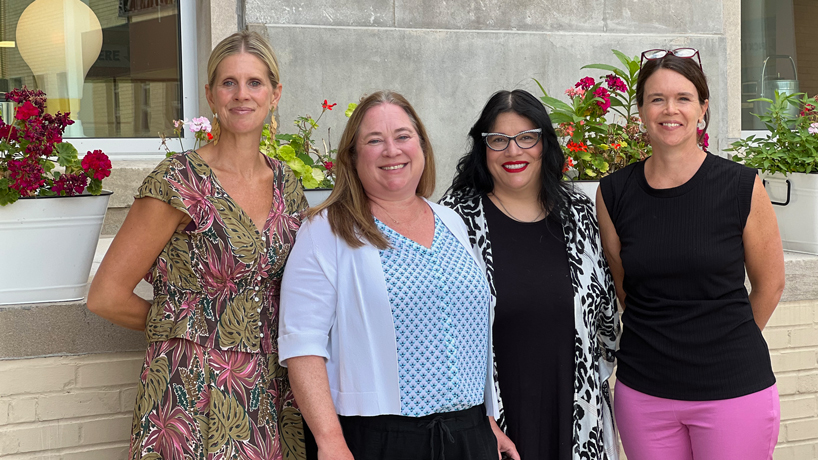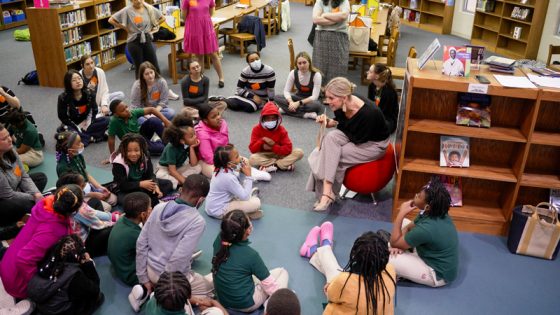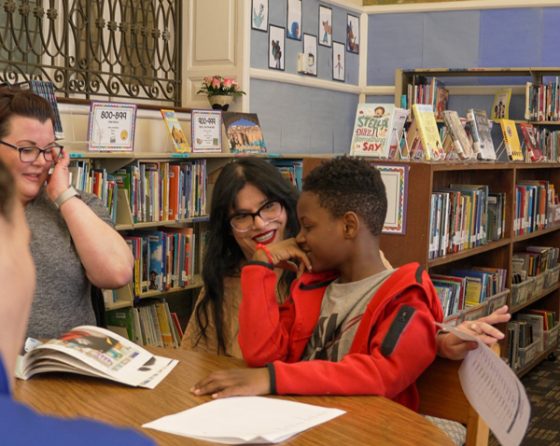
University of Missouri–St. Louis literacy faculty members (left to right) Assistant Teaching Professor Martille Elias, Associate Teaching Professor Katie O’Daniels, Assistant Professor Doris Villarreal and Professor Rebecca Rogers met with Maxine Clark, the CEO and co-founder of the Clark-Fox Family Foundation, at Delmar DivINe Tuesday. The group shared approaches to literacy instruction with Clark. (photo courtesy of Ann Taylor)
Over the past decade, the College of Education at the University of Missouri–St. Louis has steadily built a team of preeminent literacy educators and researchers.
They include Curators’ Distinguished Research Professor and E. Desmond Lee Endowed Professor of Tutorial Education Rebecca Rogers; Assistant Teaching Professor Martille Elias; Associate Teaching Professor Katie O’Daniels; and Assistant Professor Doris Villarreal.
These faculty members are all active in leading literacy research professional organizations, including the International Literacy Association, National Council of Teachers of English and the Literacy Research Association. The team’s work encompasses many areas of research as well as initiatives such as the UMSL Literacy Clinic, the Gateway Writing Project and the Missouri Department of Elementary and Secondary Education’s Comprehensive Literacy State Development and Missouri Early Literacy Fellows programs.
“As teacher educators, we are part of advances in the sciences of reading and literacy,” Rogers said. “That’s the work that we do individually and collectively. Teaching literacy is complex and demands an approach grounded in science and art. UMSL’s approach emphasizes clinically rich literacy teacher education to build teacher knowledge, practice and agency.”
The College of Education also offers an alternative certification program, alongside master’s degrees in elementary and secondary education with special emphases in reading, which prepare teachers with advanced knowledge of research, theory and practice in reading and language arts.
Rogers emphasized that UMSL literacy faculty members are ultimately working to advance teachers’ knowledge and practice beyond the view that reading is simply a combination of decoding and language comprehension.
Instead, they aim to instill an active view of reading, which underscores the overlap between phonics and comprehension and prioritizes strategic, fluent, critical and joyful reading. She added that they are particularly versed in integrating the sciences of reading and literacy within culturally and historically responsive frameworks, which prepare educators to teach diverse groups of students.
How we view reading
For decades, the issue of reading instruction – particularly phonics instruction – in the United States has grabbed headlines. This is, in part, because pervasive inequities continue to exist in educational outcomes. However, the issue is far more nuanced than it is often presented to the general public.
One reason for this is the popularization of the “simple view of reading,” a formula articulated by psychologists Philip Gough and William Tunmer in 1986, which states that decoding, or word recognition, times language comprehension equals reading comprehension. The model is compelling because it’s easily understood, but there are other factors at play when it comes to literacy.
“The sciences of reading – emphasizing the plural here because of all of these traditions of research, anthropology, sociology, linguistics, psychology and neuropsychology – over the past 30 to 40 years have resulted in advances in reading and literacy beyond that simple definition,” Rogers said.
Assistant Teaching Professor Martille Elias leads a demonstration lesson for UMSL education students and elementary school students. (Photo courtesy of Rebecca Rogers)
In recent years, the public’s fixation on how students are taught to read has often turned to the “science of reading,” which members of the UMSL literacy faculty say is more accurately described as the “sciences of reading.” Yet, there are still challenges presenting this model.
Villarreal noted that there isn’t a singular definition of the sciences of reading, and O’Daniels added that it is a broad body of research that becomes narrowly defined in media coverage.
“The science of reading is research-informed instruction, and we are all teacher educators who are very knowledgeable about literacy research and are conducting and adding to that body of research ourselves,” O’Daniels said. “I think the way that it gets defined can either limit or expand the discussion. One of the things that happens is that it becomes very simplified in the media for an audience of laypeople, and it gets really boiled down to phonics. Yes, phonics is essential. Yes, explicit, systematic phonics is essential, but it can’t stop there.”
Recent research has shown that a focus on responsive and differentiated phonics, phonemic awareness and fluency instruction coupled with immersion in reading meaningful texts can account for what happens with students at the earliest levels of reading, but it becomes more complicated going forward.
“Things like being able to make inferences, the amount of background knowledge you have around a topic, being able to monitor your own understanding as you read, those are all things that are going to contribute to the differences in reading achievement at later grades beyond those first early literacy, primary grades,” O’Daniels said. “What we try and help teachers understand as we think about this research is that it’s really a comprehensive view, and that there are differences – what might be emphasized in a primary grade and what might be emphasized in a later grade, or what might be emphasized for different readers of different ability levels, different interests.”
The sociocultural circumstances of students and texts that resonate with all students are also important aspects of reading – things omitted in the simple view of reading.
“It doesn’t take into account language culture, using authentic children’s literature where you see yourself,” Villarreal said. “I did not have a book where I had a brown character or Latino character, a Spanish speaker represented. Everything was white for me through my schooling experiences.”
One strand of Villarreal’s research focuses on the study of children’s literature that supports linguistically and culturally diverse students.
Taking this research into account, the UMSL literacy faculty is working to promote an active model of reading. Rogers said it includes bridging processes between word recognition and comprehension, as well as engagement, fluency and motivation. It also prioritizes joyful reading.
This can be seen in action in UMSL’s Literacy Clinics, where pre-service and in-service educators are prepared with research-informed practices and local students who are reading and writing below grade level receive tutoring.
Community connections through literacy
The UMSL Literacy Clinic was initially founded as the Normandy Reading Clinic in 1966 as a partnership between the Normandy Schools Collaborative and UMSL. Over the decades, the clinic has evolved from a face-to-face, university-based clinic to prepare literacy specialists to community-based and school-based literacy clinics that prepare pre-service and in-service teachers.
“It started as the Normandy Literacy Clinic, and it was very much community-based,” Elias said. “There are shifts and trends all the time in education, but I love that, specifically, we as a faculty have been really interested in being of service to the community that we are living in and teaching in.”
Assistant Professor Doris Villarreal (center) oversees a reading tutoring session with a young learner. (Photo courtesy of Rebecca Rogers)
Currently, the clinic is comprised of several collaborative learning sites with local school districts and an online clinic. At each site, literacy faculty members prepare teacher candidates to teach literacy and to integrate literacy instruction within and across content areas. They also prepare experienced teachers to become literacy specialists or literacy coaches through the graduate program, with emphasis in K-12 literacy. The vision and support of the E. Desmond Lee Tutorial Endowment, part of UMSL’s Des Lee Collaborative Vision, has been essential in building and expanding these learning ecologies.
Rogers said this clinically-rich teacher education is the hallmark of UMSL’s program, which started with graduate students but was extended to the undergraduate students in 2014 and is currently under the supervision of Elias and Villarreal.
Participation in the literacy clinic is built into the coursework for undergraduate and graduate students. Elias and Villarreal oversee UMSL undergraduate students as they go into local schools to work one-on-one or in small groups with students who need help with reading and writing. O’Daniels and Rogers also work with teachers in alternative and additional certification pathways to facilitate online literacy clinics with children from the UMSL footprint and other historically underrepresented areas of St. Louis.
The UMSL students administer assessments and develop lesson plans, which might include activities and subjects such as poetry, guided reading, reading aloud or word study, phonics and writing that are specifically tailored to the children they’re working with.
“They are taking the theoretical of what we learned in class and directly applying it to the practicum and their work,” Villarreal said. “Then, for me, they submit lesson plans. Every week, I give them feedback, and then they reflect on their lesson.”
This feedback happens alongside the professors’ observations and coaching that occurs during the literacy tutoring sessions. In these moments, teachers have “aha” moments where they understand how concepts such as an accuracy level in reading, the four-part processing model or comprehension monitoring contributes to their effective literacy teaching.
Working individually with children in local schools underscores the importance of building connections in literacy education, particularly for pre-service teachers. In order to be effective, educators have to truly know the student in front of them and their interests and needs. Reflection on that work also allows educators to address their biases and assumptions about working with students of color and underserved communities.
To those ends, the UMSL Literacy Clinic provides educators with a wide library including eBooks, decodable texts, award-winning children’s literature, multicultural texts and popular chapter books. They also have access to technology to support spelling, phonics instruction, word study, writing and even the publishing of student-authored stories.
Beyond literacy education, the UMSL Literacy Clinic is working to connect with families from communities surrounding UMSL and their literacy practices through innovative means. For instance, faculty members bring in diverse local and national children’s authors each semester to connect with those families. These high-profile authors visit clinic sites and provide demonstration workshops for families and teachers on how to engage children and young people with their books and to see themselves as authors.
Additionally, each summer, the clinic, with support from the E. Desmond Lee Tutorial Endowment, leads a community literacy initiative. This year, Scholar in Residence Kelly Byrd created a book club for 6-8th grade students at Girls Inc., a nonprofit that provides educational and cultural programs in safe environments for girls. The students read “It’s Not Bragging If It’s True: How to Be Awesome at Life,” by Zaila Avant-Garde, the first African American student to win the Scripps National Spelling Bee. They also participated in a spelling bee at Girls Inc., played word games, wrote book reviews and designed vision boards.
Reading instruction is likely to remain a perennial topic of discussion, but faculty members at UMSL are confident that they continue to make a difference, from their students in the College of Education to countless children and young people throughout the St. Louis region.
“I think that we’ve built a real presence in the community,” Rogers said. “I think that allows us also to really use our clinic spaces as collaborative sites of research and teacher education and make a meaningful difference in the literate lives of teachers and students.”
















